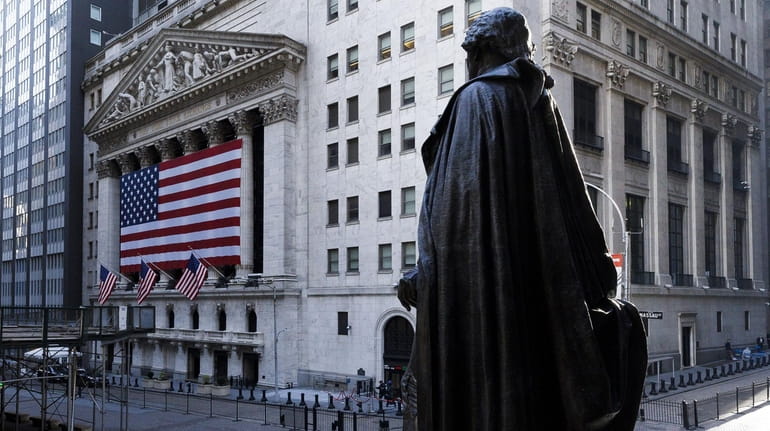LI likely to feel impact of smaller Wall Street bonuses this year

State income tax on Wall Street bonuses generates state revenue used to support public schools, colleges and social services. Credit: EPA-EFE / Shutterstock/Justin Lane
Bonuses earned by Wall Street employees, a key driver of Long Island’s economy, will drop this year as stock markets are buffeted by the coronavirus pandemic, state Comptroller Thomas DiNapoli predicted Tuesday.
“The serious damage that COVID-19 is inflicting on financial markets and the global economy will sharply reduce [securities] industry profits this year” and therefore employee bonuses, he said. “The securities industry is integral to New York State’s and New York City’s economies as a source of tax revenue and job creator.”
Wall Street bonuses plummeted after the 2007-08 financial crisis and after the Sept. 11, 2001, terrorist attacks, falling 47% and 33%, respectively, according to data from the comptroller’s office.
DiNapoli’s gloomy forecast on Tuesday came as he announced the average Wall Street bonus increased 3% to an estimated $164,100. The bonuses were paid by stock brokerages and investment banks in New York City between December and this month for work performed in 2019.
A year ago, the average bonus was $159,800.
Wall Street firms paid a total of $29.3 billion in bonuses compared with $28.3 billion a year earlier.
Kevin Law, president of the Long Island Association business group, said state income tax on bonuses generates state revenue used to support public schools, colleges and social services.
“There’s a direct relationship between the property taxes that homeowners and businesses pay and the amount of school aid allocated to Long Island,” he said Tuesday. “Smaller bonuses mean less state revenue and therefore less school aid.”
About 20 percent of Long Islanders typically commute to the city for jobs, many of them on Wall Street, according to research by the LIA and the Center for An Urban Future in Manhattan. Those receiving bonuses often purchase second homes on the East End and apartments in Manhattan, automobiles, boats and vacations to exotic locales. Some also pay for private schools for their children.
“A lot of folks who work on Wall Street live in Nassau and western Suffolk, and they bring their disposable income back to Long Island. So, the shops on Main Street will be impacted by reductions in bonuses on Wall Street,” Law said.
Last year, the securities industry in New York City added 2,100 jobs, bringing total employment to 182,100. However, the workforce is still 4% smaller than it was before the financial crisis, according to the comptroller.
DiNapoli based the size of the average bonus on total employment in the securities industry in the second half of 2019, but not all workers received a bonus. The estimate does not include people working outside of New York City or stock options and other deferred compensation for which taxes haven't been withheld.

